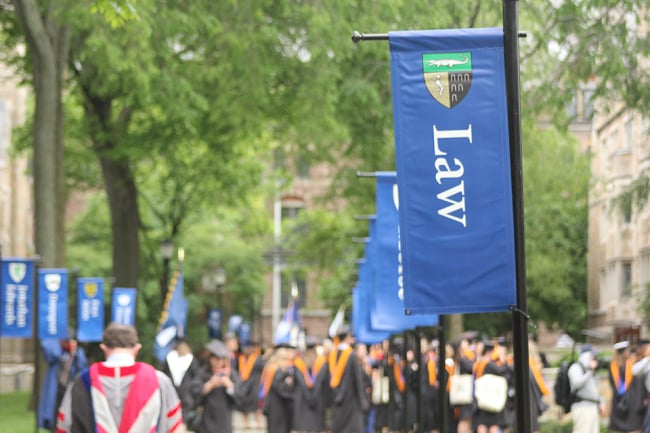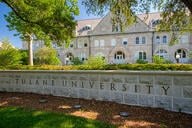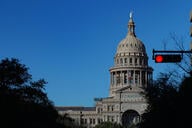You have /5 articles left.
Sign up for a free account or log in.

Free speech concerns linger at Yale Law School.
Facebook/Yale Law School
Recent issues at Yale Law School are back in the spotlight after a conservative judge called on his peers to abstain from hiring Yale Law graduates as clerks because of free speech concerns.
Judge James Ho, a Trump administration appointee to the U.S. Court of Appeals for the Fifth Circuit, urged the boycott last month when addressing a Federalist Society event in Kentucky. He argued that Yale Law students haven’t faced consequences for shutting down a speaker last year, meaning “Yale not only tolerates the cancellation of views—it practices it.”
Now other judges are slowly signing on to Ho’s boycott, an effort that has landed at the same time Yale Law announced new student disciplinary policies and efforts to protect free speech.
Unpacking the Controversy
Though Ho’s remarks came this fall, the key incident at the heart of the boycott occurred in March, when students disrupted a panel at Yale Law School featuring Kristen Waggoner, general counsel for Alliance Defending Freedom, a conservative advocacy group that has often been criticized for its positions on LGBTQ+ issues. The panel ultimately proceeded, but it was marked by protests that later spilled out of the room and into nearby hallways.
Afterward, nearly 400 students signed an open letter scolding Yale administrators for bringing an anti-LGBTQ+ speaker to campus and having uniformed police officers present, among other complaints. The students accused Yale—and the Federalist Society chapter that sponsored the event—of providing legitimacy to a “hate group,” as the Southern Poverty Law center has classified ADF—a classification that ADF leaders dispute.
The students who disrupted the event were not punished.
Now Ho—who did not respond to a request for comment—wants to leverage his power as a federal appellate judge to teach students a lesson, announcing at the Federalist Society event last month that he would no longer hire Yale Law graduates going forward and encouraging fellow judges to do the same. His plan is to force change at Yale by squeezing enrollment.
“Across the country, there are thousands of young people who are about to apply to law school. I would encourage them to think about the kind of legal education they want and the kind of academic environment that will help them grow,” Ho said at the event. “If they want the closed and intolerant environment that Yale embraces today, that’s their call. But I want nothing to do with it.”
The call for a boycott is not new; another federal judge advanced the idea to colleagues in the spring. But then it seemed to go largely unheard; now the boycott idea has captured attention, though it remains to be seen if that will concretely impact judges’ hiring considerations.
Exactly how many judges are backing Ho is unclear. So far only Elizabeth Branch, who sits on the U.S. Court of Appeals for the 11th Circuit, has publicly attached her name to Ho’s cause. Another 12 judges have reportedly signed on anonymously, according to the Washington Free Beacon, a conservative publication that has come under fire in recent years for making false claims—including that Europe was going to require products to be listed as “Jewish made” and that the U.S. Department of Health and Human Services planned to give out free crack pipes.
(Ho and Branch will reportedly get a chance to raise their concerns about free speech at Yale directly at the university. Legal writer David Lat reported Thursday that the judges had accepted an invitation to appear on a panel at Yale, possibly in January, to discuss “free speech and intellectual discourse” at the law school.)
Yale Law School has not directly responded to or publicly addressed calls to eschew graduates for clerkships. However, with the controversy still fresh, administrators released a statement last week addressing free speech issues and their commitment to advancing free expression.
“Yale Law School is dedicated to building a vibrant intellectual environment where ideas flourish. To foster free speech and engagement, we emphasize the core values of professionalism, integrity, and respect. These foundational values guide everything we do,” Dean Heather Gerken wrote in an Oct. 12 post titled “A Message to Our Alumni on Free Speech at Yale Law School.”
In the post, Gerken goes through a number of steps Yale has taken to improve free speech, including revising its disciplinary code, banning surreptitious recordings and hiring a new dean of students “focused on ensuring students learn to resolve disagreements among themselves whenever possible rather than reflexively looking to the institution to serve as a referee.”
But the timing of Gerken’s message isn’t necessarily a direct response to Ho and other critics, according to a Yale Law School spokesperson who said that the letter’s release had already been planned to highlight the disciplinary code changes. Among other things, interfering with sponsored events or functions in a “reckless” way is now deemed a major violation. Efforts to revise the code began last fall and mark the first such update in 50 years, a spokesperson said.
The View From Outside
As Ho’s remarks gained traction online, the legal community responded with both praise and criticism.
Josh Blackman, a law professor at South Texas College of Law, argued on Reason, a libertarian-leaning news site, that Ho’s boycott can be successful by forcing students to think about their career prospects and enrollment choices. Will applicants choose Yale for its prestige if that decision is used against them by employers?
“Judges exercise a lot of discretion over who they hire,” Blackman told Inside Higher Ed. “In other words, there will always be more people applying for these jobs than they could ever possibly hire. So judges use different screens to decide who they will hire and who they will not hire. Invariably, ideology makes a difference. Not for all judges, but for most judges ideology will factor in. Conservative judges tend to hire conservative clerks, and liberal judges tend to hire liberal clerks. That’s just a fact of life.”
He sees Yale as “the canary in the coal mine”: the issues under protest at Yale now are the causes that will flow down to less progressive campuses in years to come. Efforts like Ho’s can force colleges to pause and re-evaluate the state of free speech on campus, Blackman said; the purpose of the boycott is “to promote change that would eliminate cancel culture” and pressure Yale to expand free speech or suffer consequences.
Scott Greenfield, a longtime defense attorney in New York who writes the blog Simple Justice, opposes Ho’s boycott. He doesn’t believe the idea will catch on and questions the effort.
“If they’re trying to send the message to Yale, that they have gone too far over the edge of canceling free speech, I can understand that. But this is not the right way for judges to send a political message. Part of that job is to not reflect political bias in the course of their position,” Greenfield told Inside Higher Ed.
He also questions how shunning Yale Law School graduates will affect innocent parties, arguing that a boycott will punish all students broadly—including conservatives.
“Yale may be recognized at the moment because of some of its more outlandish problems, but I’m sure like any school it has a variety of students with a variety of views. And some kids may be keeping their heads down, because being a little more moderate, or even conservative, isn’t popular right now. But that doesn’t make them bad lawyers and law students and bad candidates for clerkships. Why would you make them suffer for the administration?” Greenfield said.
Others, like Ilya Shapiro—who resigned from Georgetown University Law Center following outrage over a tweet about race as a factor in judicial nominations—have also thrown their support behind Ho, arguing that the boycott is a consequence for future Yale Law students who choose to attend an institution that conservatives have deemed intolerant of their views.
But according to Reuters, multiple conservative judges oppose the boycott. Conservative judge Jerry Smith, of the Fifth U.S. Circuit Court of Appeals, decried the move.
“I regularly (and recently) have had Yale clerks who, consistently, are extremely talented and performed spectacularly in upholding the rule of law and supporting toleration for diverse viewpoints,” Smith wrote in a post on an online application system for federal clerkships.
Smith, a Yale Law grad and Reagan administration appointee, called the boycott “regrettable.”
Those on opposite sides of the boycott have found room for agreement—particularly regarding Yale’s failure to punish the students who disrupted the panel, which both sides believe sends the wrong message. Blackman suggested that the lack of consequences indicates that Yale Law School doesn’t take such disruptions seriously.
Greenfield echoes similar concerns.
“Yale’s response was the sort of empty verbiage that you expect out of an administrator who says all the warm and fuzzy things you hope they would say but reflects absolutely no action, nothing concrete, nothing you can pin them to. It’s just nice-sounding words—it doesn’t mean anything; it doesn’t do anything,” Greenfield said. “Perhaps what they can do is discipline those people who have violated those warm and fuzzy words, perhaps they can take action in some concrete fashion such as, bring in a speaker that people find politically incorrect today and say, ‘This is somebody that you should listen to. And if you don’t like them, don’t go. But if you do, Yale will support their ability to speak at the school.’ Yale should take some sort of meaningful action.”




